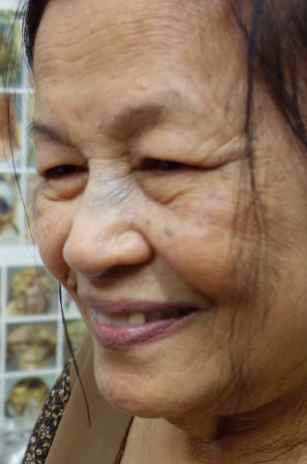We sat on the balcony of our hotel in Thailand when what looked like a mosquito perched on the railing right in front of us. We leaned in for a look.
We never worried much about mosquitoes before this trip – other than to steer clear so we wouldn’t suffer the effect of bites. Now we thought back to our meeting with the travel nurse to get ready for our round the world trip. She described all the diseases we could contract as we traveled in Asia and Africa. What a list! Mosquitoes stood out on the list of critters to avoid; they are carriers of malaria and Japanese encephalitis.
A week after spotting the mosquito on our porch railing, we walked over to the Museum of World Insects and Natural Wonders in Chiang Mai to take a look at their highly praised private collection.
We had just started looking at the giant wasp and hornet nests when a lovely older woman came over to introduce herself.
Dr. Rampa Rattanarithikul, a founder of the museum with her husband, told us she had lived in Washington, DC (where we worked before starting our round the world trip). She had worked at Walter Reed Army Institute of Research and the Smithsonian.
She started her career in her teens and learned as she went along, becoming a world expert. In her 50’s she earned a doctorate, from Kobe University in Japan, learning Japanese in order to accomplish her goal.
Along the way she received many awards, and, at the end of her career, she was the key author of “Illustrated Keys to the Mosquitoes of Thailand”, a 6-volume work.
What did we learn about mosquitoes at the Museum and from Dr. Rampa Rattanarithikul? Of 450 species of mosquitoes in Thailand only 10 carry or transmit a disease. Mosquito species differ a lot in size and appearance. She suggested that well-intended public health efforts to eradicate all mosquitoes in an attempt to eliminate the 10 vector species might have unintended and bad consequences for the balance of the ecosystem. We’ll take her query seriously, as who would know more about mosquitoes than she would?
We did eventually get back to our self-guided tour of the Museum, and it presented a lot to see: insects, fossils, seashells, dinosaur eggs, rocks, carved elephants, and more wonders of the Natural World.
Even the most amazing rare fossils we saw that day can’t match our pleasure and honor in meeting Dr. Rampa Rattanarithikul. The intelligence, drive and determination it must have taken to be a top-level scientist in her day, especially someone who was self taught, was our most interesting find at the Museum.
November 2013








My goodness, six volumes about mosquitoes. That is quite an achievement.
Interesting stuff about mosquitoes. It always worries me that control measures aren’t specific enough. The ones that transit diseases are my worst enemy, though (don’t forget Dengue Fever on the list – especially this year!).
Just saw news report of experiments with genetically modified male mosquitoes to reduce populations of particular vector species. Controversial.
I’ll bet!
I enjoyed my visit there too. My friend wrote an amazing post about it here: http://artoferickuns.wordpress.com/2013/07/21/a-painter-of-moquitoes/ >>>it’s also a very educational post.
And lucky you met Dr. Rampa! Cheers.